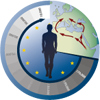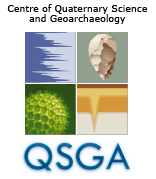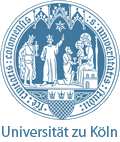International Conference at the University of Cologne
December 1–5, 2020 | 3 to 6 pm
Organizers: Thiemo Breyer & Niklas Grouls
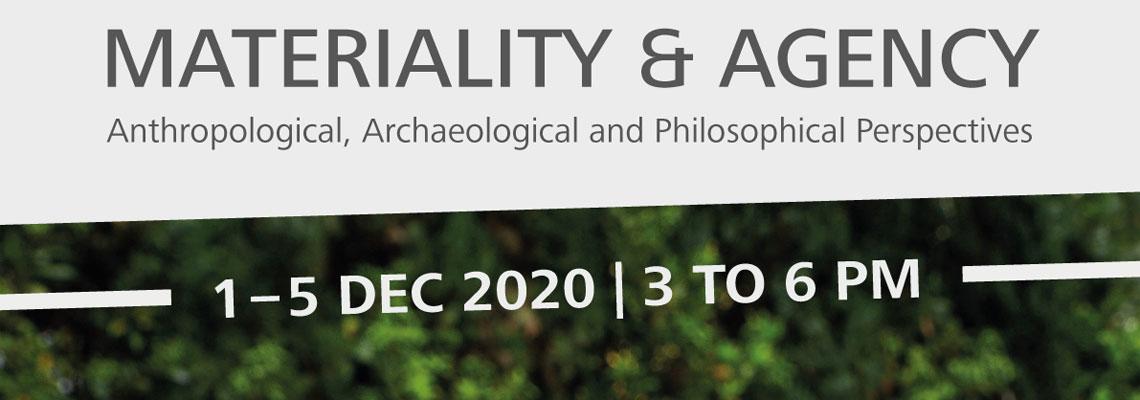
This conference reflects upon materiality and agency as two interrelated concepts in the study of human development, culture, and cognition. It provides a platform for critically assessing and evaluating crucial terminologies and notions in the fields of philosophy, anthropology, and archaeology. Whereas archaeology depends on material remains of past societies, on the basis of which patterns of agency can be reconstructed, anthropology investigates the observable agency of individuals and groups in their cultural embedding. One important aspect of such anthropological inquiry is the interconnection of human activity with the environment and material objects. Insofar as human agency responds to ecological demands and utilizes materiality to form cultural artefacts, both concepts – agency and materiality – can be regarded as correlates on a theoretical level.
Questions of cultural innovation and transmission are furthermore considered at the conference as being bound up in the circularity of agency and materiality, thereby shaping local, regional, and transregional industries, productive economies, and mobility patterns of humans. The general interest concerning which changes in cultural production lead to which expansions or retreats of our species, which technologies enable which kinds of mobility, and which artefacts can be taken as evidence for migration (e.g. by multi-local findings of the same kinds of artefacts) provokes the question what exactly is signified by terms such as “technology”, “artefacts”, or “mobility” as a special form of human agency. While it is generally agreed that the interplay of climate, environment, and human agency (cultural factors) is essential for the dispersion and mobility of human populations, it is still debatable as to how we can conceptualize cultural change and its material correlates in a way that is accessible to empirical validation.
This gap in conceptual clarification shall be addressed in the philosophical and interdisciplinary efforts of this conference by locating the key meanings in the relevant fields and interpreting them against the background of recent debates in the humanities and social sciences. Although a wide variety of different theories, rooting in various scientific efforts, is desired, one explicative concept linking archaeology and anthropology may be that of the “life-world”, which designates the pre-theoretical, everyday world of socio-cultural meaning that is reproduced and reenacted by agents through material practices and social codification. When archaeologists engage with the meaning that an object (e.g. a tool or ritual artefact) might have had for prehistoric humans, then the task consists in embedding this object within the larger context of the prehistoric life-world. The object belongs to a past that was constituted by a network of things and practices in a specific sociocultural and environmental milieu. But often, many of the elements co-constituting this life-world are unknown or have to be inferred indirectly. However “agency” means one ultimate goal of archaeology, i.e. understanding not only the actions behind material remnants, but rather the life-worlds of their creators and thus prehistoric humans beyond the stage of materiality. “Contextual areas” as epistemic constructs guiding fieldwork and data retrieval are one of the bases for such inferences. In anthropological investigations of current populations on the other hand, their life-world, including human-animal and human-environment interfaces, can be studied on the basis of observable agency. Nonetheless, as this paradigm implies, the differences between indigenous and scientific conceptualizations, of emic and etic perspectives, also require resources for valid inferences to bridge the conceptual gaps and integrate both perspectives into overarching models. Hence, in the case of archaeology and anthropology questions concerning both materiality and agency often lead to fundamental methodological struggles.
On a meta-level, the conference therefore also intends to trace the mechanisms in which scientific knowledge about life-worldly occurrences and factors that shape human industries, economies, and self-interpretations is created and stabilized. The question for the chosen interdisciplinary combination then is how material remnants of the past as well as observed and modelled agency patterns of current populations can be transformed into “epistemic objects” in archaeology and anthropology and what philosophical analysis can contribute to their interpretations.
In order to receive the link to the conference meetings via Zoom, the organizers kindly ask every participant to register for the conference by sending a mail to niklas.grouls@uni-koeln.de. The conference is free of charge.
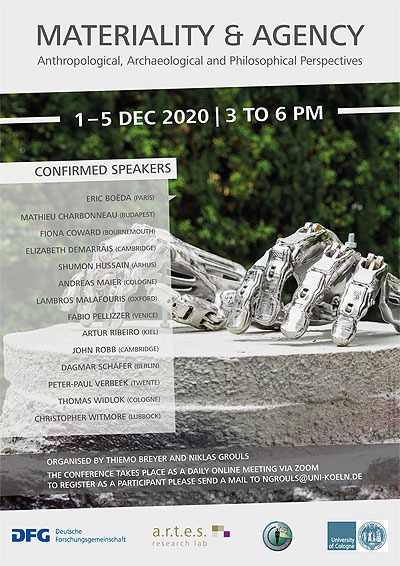 |
| Download POSTER as PDF |
Confirmed Speakers:
- Eric Boëda (Paris)
- Mathieu Charbonneau (Budapest)
- Fiona Coward (Bournemouth)
- Elizabeth DeMarrais (Cambridge)
- Shumon Hussain (Århus)
- Andreas Maier (Cologne)
- Lambros Malafouris (Oxford)
- Fabio Pellizzer (Vienna)
- Artur Ribeiro (Kiel)
- John Robb (Cambridge)
- Dagmar Schäfer (Berlin)
- Peter-Paul Verbeek (Twente)
- Thomas Widlok (Cologne)
- Christopher Witmore (Lubbock)
